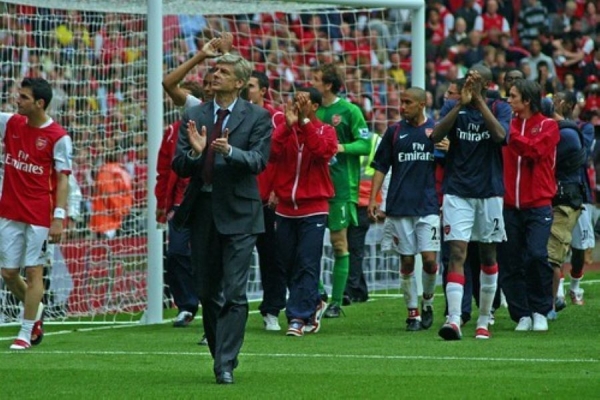So, let’s take a look at how the former Arsenal manager transformed English football.
A Catalyst in Changing Player Habits
Although it is now a thing of the past, a drinking culture was common among many of the country’s top-flight clubs. However, the years that proceeded Le Professeur’s appointment as Arsenal manager saw a shift in athlete lifestyle choices. While this cultural alteration can also be attributed to the growing commercialization of Premier League football, the Frenchman’s forward-thinking approach to off-the-field professionalism aided in modernizing player habits.
According to a piece in The Guardian by a former player of the Wenger era, Lee Dixon, the now 70-year-old not only revolutionized English football but, in doing so, ripped up the handbook on how to approach the sport. In seeking to raise on-field performance levels, the former Gunners manager also overhauled player diets, including being at the forefront of the club’s infamous Mars Bars revolt. Fundamentally, a shift in nutrition resulted in enhanced fitness levels, allowing the North London side to get the better of their rivals, as showcased by Arsenal’s title-winning 1997-98 campaign.
High-Intensity Football Through Shrewd Spending
Having been influenced by Rinus Michel’s style of play at Ajax during the 1970s, Arsene Wenger’s tactical approach laid the foundations for many of the preferred systems among numerous Premier League teams, including Bournemouth, who this season secured their spot as the favourites at sports betting online with Betfair to avoid relegation. At the time, the Frenchman’s one-touch, attack-minded style of play hadn’t been seen in England, as he modified the pre-existing rigid nature of a traditional 4-4-2 to guide the Gunners to their historic invincible season.
Crucially, Le Professeur was able to implement his desired system at a club which had, during the early 1990s, been renowned for its negative style of play, through a statistical approach to the transfer market. Having managed in France for the first 12 years of his managerial career, Wenger had become accustomed to foreign markets and alternative methods of player recruitment. As a result, his numbers-based route to transfers saw Arsenal sign Patrick Vieira, Robert Pires, and Thierry Henry for a combined total of £20.5 million, as per the Daily Mail.
Furthermore, throughout his early years as the manager of Arsenal, as showcased by the above signings, Wenger changed the notion of needing to buy ready-made stars instead of promising talents. Interestingly, despite leaving Arsenal two years ago, his transfer philosophy is still proving successful, as players like Alex Oxlade-Chamberlain and Hector Bellerin continue to play for two of England’s most famous clubs.
A Unique Ability to Develop Players
Ultimately, in the words of the current Liverpool manager, Jurgen Klopp, Arsene Wenger is more than just another manager, he’s both an influencer and a role model. Even though some will only remember Wenger’s concluding period at Arsenal, which saw his relationship with the fans turn sour, English football wouldn't have become the much-loved, all-action league that it has without the Frenchman and his revolutionary contributions to nutrition, recruitment, and style.
Top Image "Arsène Wenger" (CC BY 2.0) by Ronnie Macdonald



